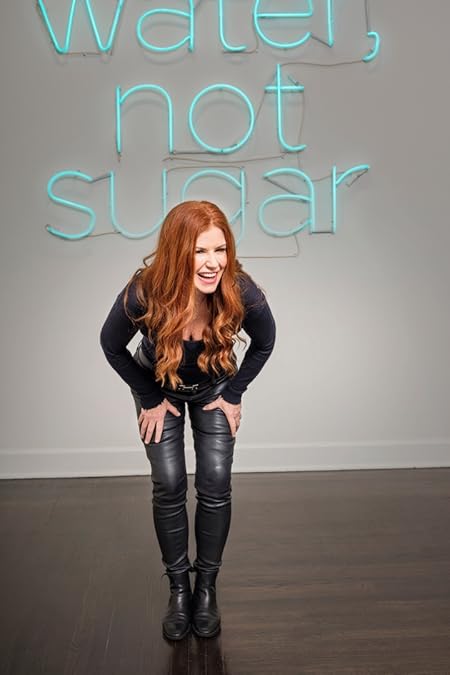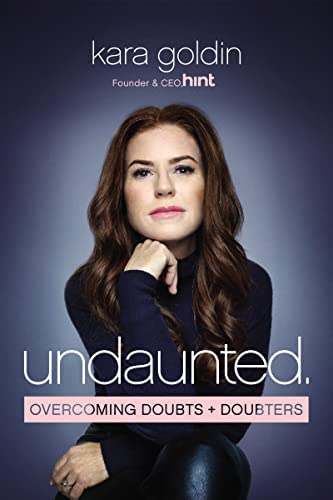Undaunted, Overcoming Doubts and Doubters by Kara Goldin
Recommendation
Kara Goldin, founder and former CEO of Hint, Inc., created the United States’ top brand of unsweetened flavored water. When she wanted to lose weight, she replaced her diet soda with fruit-flavored water that she made in her kitchen. Family and friends loved it so much she decided to sell it. The first 10 cases sold out in two days at Whole Foods. Goldin recounts her entrepreneurial perseverance in building Hint Water, which now has retail sales well over $200 million a year across the United States.
Take-Aways
- Kara Goldin was in her mid-30s when she created her company, almost by accident.
- Goldin worked in media and technology in the early internet days.
- Goldin spent the next stage of her career in sales.
- Goldin concocted fruit-infused water in her kitchen in hopes of becoming healthier and losing weight.
- After launching Hint Water, Goldin found trustworthy partners and built her brand.
- Goldin transformed obstacles into opportunity while marketing Hint.
Undaunted Book Summary
Kara Goldin was in her mid-30s when she created her company, almost by accident.
As the youngest of five children, Kara Goldin learned early in life to fend for herself. She never wanted to be a CEO, but after working several corporate jobs and starting her family of four children, she created Hint Water, the United States’ number one brand of unsweetened flavored water.
“This is the story of how I overcame a seemingly endless series of no and you can’t and it’s impossible to create a unique product, build a thriving company, compete with some of the biggest beverage companies on the planet, and live a life filled with rich experience and constant learning”
Goldin was in her mid-30s, had worked at Time and CNN, and was seeking to shed pregnancy weight after the birth of her third child, Keenan. After drinking 10 to 12 cans of Diet Coke a day, Goldin forced herself to drink water instead, despite not liking its taste. She put fresh fruit in her water to flavor it. Family and friends loved her fruity water, and she decided to sell it.
“I let my passion and commitment to making a great product be my guide, and I stayed focused on what mattered most about the product — taste.”
She asked her local Whole Foods manager if he’d carry it. Goldin notes that he probably thought she was crazy, but he agreed to try – and the rest is history. Today, you can buy Hint in all 50 states, and it has US retail sales of more than $200 million a year.
Goldin worked in media and technology in the early internet days.
When she was 14 years old, Goldin worked at a toy and crafts store in Old Town Scottsdale, Arizona. The owner hired her to do paperwork, but soon Goldin was running the cash register. She excelled at selling because she had played with most of the toys and read the books. Goldin talked with customers about their budgets and what their children liked.
“You don’t have to be super-special, rich, earn 10 college degrees or have front-row seats at the game. You just have to be undaunted. Most of us don’t start out that way. We have to learn to be undaunted.”
Like her older siblings, Goldin attended Arizona State University. She majored in communications, but her finance classes inspired her love of reading The Wall Street Journal and Fortune magazine. Goldin wrote to Fortune managing editor Marshall Loeb about how much she wanted to work for the magazine in New York after graduating. Elated when he sent back a standard form letter suggesting that she ask for an appointment if she were ever in New York, Goldin showed up at Fortune’s offices – without an appointment.Fortune had no openings, but an amused HR executive said Time magazine might have a position in the circulation department. Minutes later, circulation executive Brooke McMurray hired Goldin for an executive assistant position. She was one of the few on-Ivy League graduates at Time. Goldin worked hard and learned a lot but struggled to make ends meet.
“Friends of mine throughout the company would tip me off every time a meeting with good food was about to end, and that’s how I ate lunch and dinner most days.”
Her job was to find “cross-title” distribution opportunities for Time, Inc. publications to boost circulation and sell ads. By the winter of 1991, she was earning decent money when she met Theo Goldin at a bar while out with friends from high school. They began dating. In fall 1992, Kara got a job offer from CNN in advertising sales. CNN’s corporate culture wasn’t a good fit, however, and she left after two years.
Goldin spent the next stage of her career in sales.
After Theo graduated from NYU, Kara and he married and moved to San Francisco for his work in technology law. Kara worked for 2Market, an early e-commerce venture that Steve Jobs “incubated” at Apple. The company mailed CD-ROM catalogs to customers showing products they could buy through its website. Goldin signed up big clients, including Starbucks and Godiva Chocolates. She called CEOs directly to land accounts.
“When I’m facing problems I can’t solve on my own, this approach — reaching out and asking questions, learning as much as I can, digging into the problem rather than running away from it — proved invaluable for getting Hint to where it is today.”
By 1996, using her secret weapon – placing cold calls to anyone she wanted to meet – Goldin had lined up a number of high-caliber clients. Then AOL bought 2Market and told all the employees they had to relocate to AOL’s corporate HQ in Sterling, Virginia. The Goldins didn’t want to leave San Francisco, so she accepted a severance package.
“If the opportunities I want are not coming to me, I thought, I’ll have to create them for myself.”
At the end of 1996, AOL executive Myer Berlow realized AOL still needed Goldin’s help and retained her as an independent sales broker. Six months later, AOL rehired her with a raise and more stock options. Goldin traveled the United States signing up clients, but found herself drinking multiple cans of Diet Coke each day because of the stress. That habit paved the way for creating Hint water.
In July 1997, Theo Goldin left his law firm job to work at Netscape. The couple’s daughter, Emma, was born in February 1999. In 2000, AOL and Time Warner merged. Kara Goldin cashed out her stock options, and concentrated on her children; Kaitlin arrived in January 2001 followed by Keenan in March 2002.
Goldin concocted fruit-infused water in her kitchen in hopes of becoming healthier and losing weight.
Kara Goldin struggled to lose the 50 pounds she had gained over the course of her three pregnancies. Determined to kick her diet soda habit, she switched to drinking water exclusively. Gradually, her energy and physique improved, but she hated the taste of plain water. One day, she sliced up a lemon and put it in a pitcher of water.She experimented with different fruits. She ditched her family’s sugary juices and soda, and they all drank her fruity water. She even asked the opinion of a clerk at her Whole Foods, and he was enthusiastic about a fruit-infused, unsweetened water. The store had nothing like it. Goldin knew nothing about selling beverages, but thought she was on to something.
“This might be the opportunity to make a difference in the world that I’ve been searching for. I could help make people healthier and feel better. That kind of feeling doesn’t come along very often. When it does, I decided, you should not ignore it. You may be looking at a new path forward.”
By spring 2004, Goldin was tinkering around with water recipes without telling Theo about her idea to market her fruity water. She turned down multiple job offers to focus on figuring out how to commercialize her water. By September 2004, she was ready to sell her flavored water, but there was one more hiccup: a surprise fourth pregnancy. She told Theo about her plans to sell her new product about eight months before the arrival of their fourth child.
“Don’t think about what you can’t do. Figure out what you can do. Then do it to the best of your ability.”
Theo quit his job because he believed in Kara’s product. She came up with the name “Hint” and the tagline, “Hint: Drink Water, Not Sugar.” Theo – an intellectual property (IP) attorney – trademarked the name. Finding a co-packer proved a challenge. An entrepreneur who ran a small Chicago company advised using a “cold fill” bottling process, and connected the Goldins with a closure (bottle top) manufacturer, a box manufacturer and a label company. By April 2005, they were ready to distribute.
With her baby due any minute, Goldin asked again at Whole Foods if her store would stock Hint. The manager agreed to carry it. Shortly before giving birth, Goldin sought to sell 10 cases of Hint at Whole Foods. While she was still at the hospital with baby Justin, she got word from Whole Foods that all 10 cases sold in two days.
After launching Hint Water, Goldin found trustworthy partners and built her brand.
Hint water overcame some launch issues, including changing to a more costly “hot-fill” bottling method to solve a problem with mold clouding the water. By early 2007, the business had momentum, but the Goldin’s co-packer was unreliable and running out of capacity, but making big demands. Unless they solved their production problems, they would soon be out of business.
Kara Goldin called a Coca-Cola executive, hoping to hear his wisdom about how to solve their bottling problems. He dismissed her question and her product saying, “Sweetie, Americans like sweet.” He didn’t believe Americans would drink something that wasn’t sweet.
“Sweet was all they knew, and sweet drinks were all they wanted to sell. That was our big and very real advantage over them — we had the commitment, the understanding, and the passion for a new approach. ”
Several years later, Coke branched out into plain water and fruit juice when it purchased vitaminwater, Fuze and Honest Tea. Ultimately, the Goldins partnered successfully with a local hot-fill company and family-owned farm, H.A. Rider & Sons in Watsonville, California.
Goldin transformed obstacles into opportunity while marketing Hint.
The Goldins wanted to introduce Hint at fast-casual chains such as McDonald’s, Dunkin’ and Starbucks. In early 2009, a Starbucks buyer called and wanted to test market their Hint Kids box, which didn’t yet exist. Starbucks was launching a line of enhanced waters and juices in its Seattle stores and wanted to include Hint. On March 9, 2010, Hint launched in Starbucks.
Hint proved so successful that Starbucks expanded its test launch to 300 locations the next year and then to 1,000 stores. Ultimately, all 6,700 Starbucks stores carried blackberry-flavored Hint, but the Goldins had only one month to produce 964,800 bottles, their biggest quantity to date. Starbucks’ goal was to sell a few bottles per store per week, but Hint exceeded that goal. Media attention helped with sales. Men’s Health magazine called Hint the “Best Flavored Water” available, and CNBC aired a five-minute story on its show, How I Made My Millions, in September 2010.
In 2012, the Goldins got devastating news from a Starbucks executive. Then-CEO Howard Schultz wanted to add food to Starbucks’s offerings; Starbucks told the Goldins they were going to remove two Starbucks’ products and one Hint product to make room.
“Every company and every work situation is different, but there is no question that young, fast-growing startups are full of uncertainties and play by a different set of rules than well-established companies.”
The Goldins had produced six months’ worth of bottles of blackberry Hint to keep up with Starbucks’ demand. This taught them a powerful lesson. When that door closed, another opened; an Amazon buyer wanted to add Hint to its new grocery business. Amazon offered a potent sales outlet, but refused to share proprietary data about who purchased Hint online. The Goldins preferred to invest in direct sales than rely on third parties, so they established a website to sell Hint directly. Today, almost half of Hint’s customers buy directly from its website.
Kara Goldin’s personal story resonated with customers as Hint became more than just a brand. Customers liked different aspects of the Hint saga: Kara’s weight-loss struggle and Theo and Kara’s entrepreneurial spirit and courage in competing against big beverage companies. Kara’s increasing media presence as a successful female entrepreneur boosted sales. Hint grew from a married couple doing everything to having five employees, then 20, then 65, and now about 200 employees in its New York and San Francisco offices.
“I hope that some of the stories I’ve shared…will help its readers find the courage and strength to chart their own course forward and upward as we emerge from these difficult times.”
Coca-Cola and Pepsi tried to compete with their versions of flavored water. Coke offered Dasani Essence, with flavors in lime, strawberry-kiwi and black cherry; all failed because, Goldin says, “They did not capture true fruit flavor like Hint does.” Pepsi and Nestlé had teams working on flavored water, but customers still preferred Hint in blind taste tests. Nestlé never even put its product on the market.
About the Author

Founder and former CEO of Hint, Inc., Kara Goldin hosts the podcast, The Kara Goldin Show. She left her position as CEO in November 2021, but remains an active board member, shareholder and, as she says, “the number 1 fan of Hint water.”

